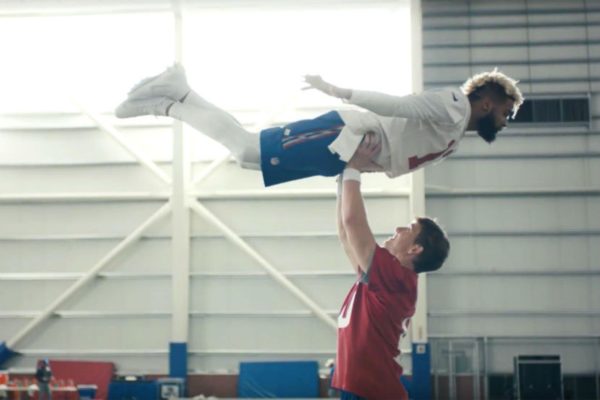Super Bowl commercials are truly one in a million. Or more accurately, 30 (seconds) for 5 (million). Realistically, these are the only commercials Americans really watch in the moment and talk about the next day and beyond.
And while the economic value of these commercials is obvious, their role in reflecting cultural norms is more subtle, but arguably holds more value. This is especially true with ads featuring sports icons that have the clear impact on shaping how girls and boys, men and women, frame their own gendered identities and expressions.
2018 was no exception. And this time, the ad that did this most effectively was the one produced by the NFL.
The ad features the grace-challenged Eli Manning of the New York Giants and his wide-receiver teammate, the ever-smooth Odell Beckham Jr. The two are engaged in a dynamic and intimate dance on the field to “(I’ve Had) the Time of My Life” from the “Dirty Dancing” soundtrack. After running a route, they then jump into each other’s arms and creatively dance to the song in a way even Patrick Swayze would applaud.
At one point, their efforts are almost stopped by a disapproving coach — looking to “police” this potential infraction of how men should interact on a field. Fortunately, the fun continues as a teammate stops the coach with a simple proclamation: “Just let them dance.”
Of course, the original purpose of the ad is to promote the NFLs decision to “fun up” their league by allowing more creative touchdown celebrations. Yet others may consider the ad an effort to “lighten the mood” after a down year in ratings. And there is definitely room for the NFL to need to lighten the mood and change their narrative. Amid lower ratings, several high-profile domestic violence cases, and that national anthem protest causing controversy, it’s been a challenging year for the NFL.
But let’s give it to the league when they do something effective that can have a positive effect. This ad wouldn’t have happened five or 10 years ago. Back then, there would be too much fear about what messages might have been inferred around the “actors’ ” sexual identity. The homophobia jokes would outnumber those who “embraced” the ad, its humor and its messages.
And they wouldn’t have had the star athletes step up for the job.
Football players are going to select ads they are comfortable with, those that reflect the culture we live in and the images they are comfortable portraying. For generations, men were taught they needed to be very careful about how they look at and touched one another. Man-hugs have become acceptable, for instance, but dancing to “Dirty Dancing” on national TV on Super Bowl Weekend? Not tolerable.
But things might be slowly changing. And perhaps the NFL, by creating this instant classic commercial, might be helping in some small but meaningful way.
An ad like this shows us a different message of masculinity — one of playfulness, creativity, closeness with other men.
The GoDaddy model of Super Bowl commercials, with their extremely sexualized advertisements with attractive women being the means of communicating messages, and their implications on how young men see themselves may now be outdated – slowly on its way out like the John Wayne model of manhood. And the messages surrounding what this might “mean” about one’s masculinity or sexual orientation, while not completely in the rearview mirror, may be slowly dissipating.
What we do know from the research on men and masculinity is it’s healthy for men to connect with one another and express their emotions. Men need a sense of closeness in their relationships with conversations and extend beyond football discussions and locker room banter.
While this ad intends to reinforce the “loosening up” of the rules for touchdown celebrations, it may have helped loosen up the ever-changing playbook of masculinity.
Let’s make it where it’s OK for men to truly have closeness with each other in its many different ways of expression. Let’s “let them dance,” literally and figuratively — on and off the field, on and outside of TV commercials. That would be something really to celebrate.
Aaron B. Rochlen is a professor of educational psychology at The University of Texas at Austin.
A version of this op-ed appeared in Psychology Today and the Corpus Christi Caller Times.
To view more op-eds from Texas Perspectives, click here.
Like us on Facebook.




